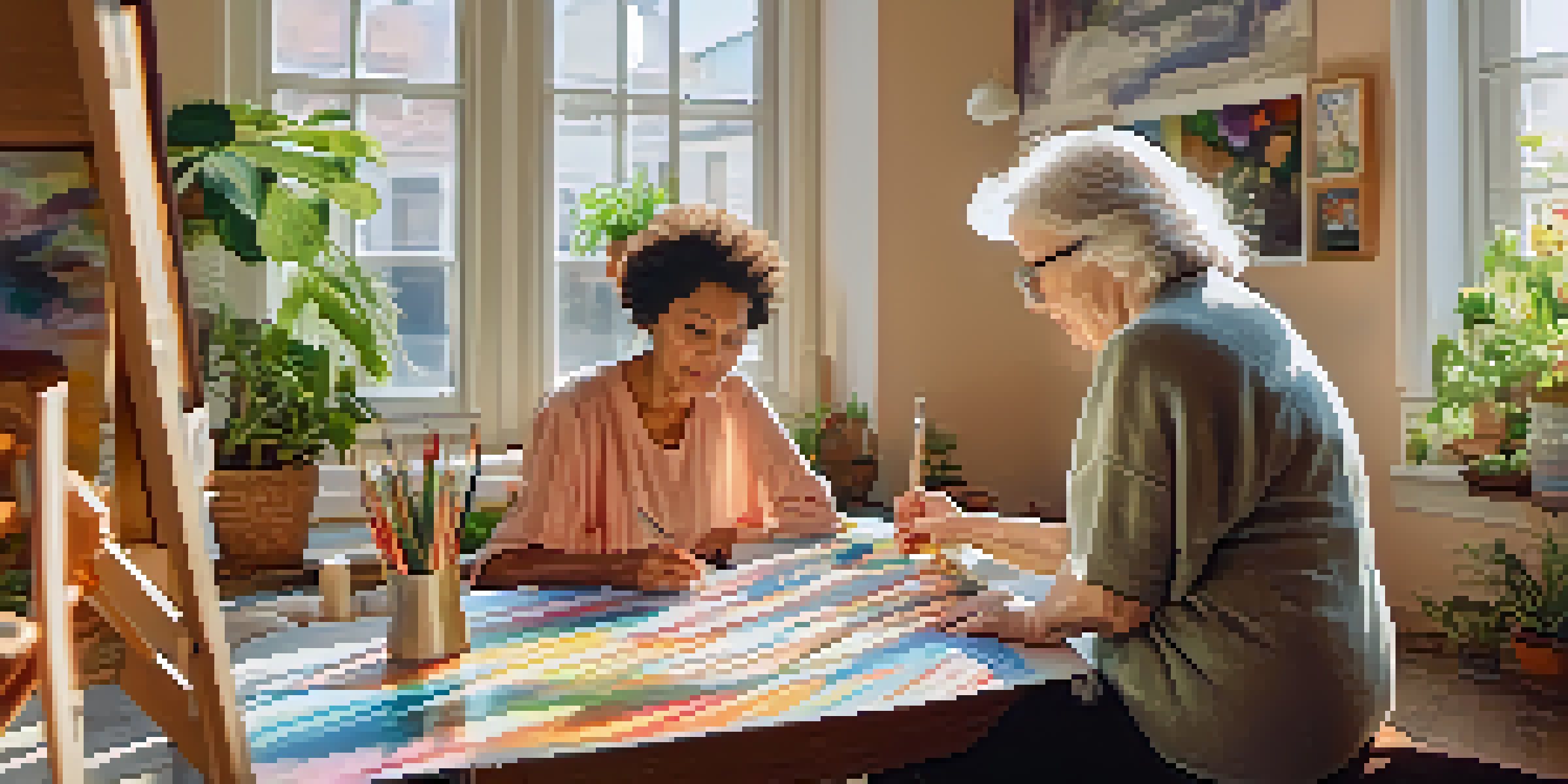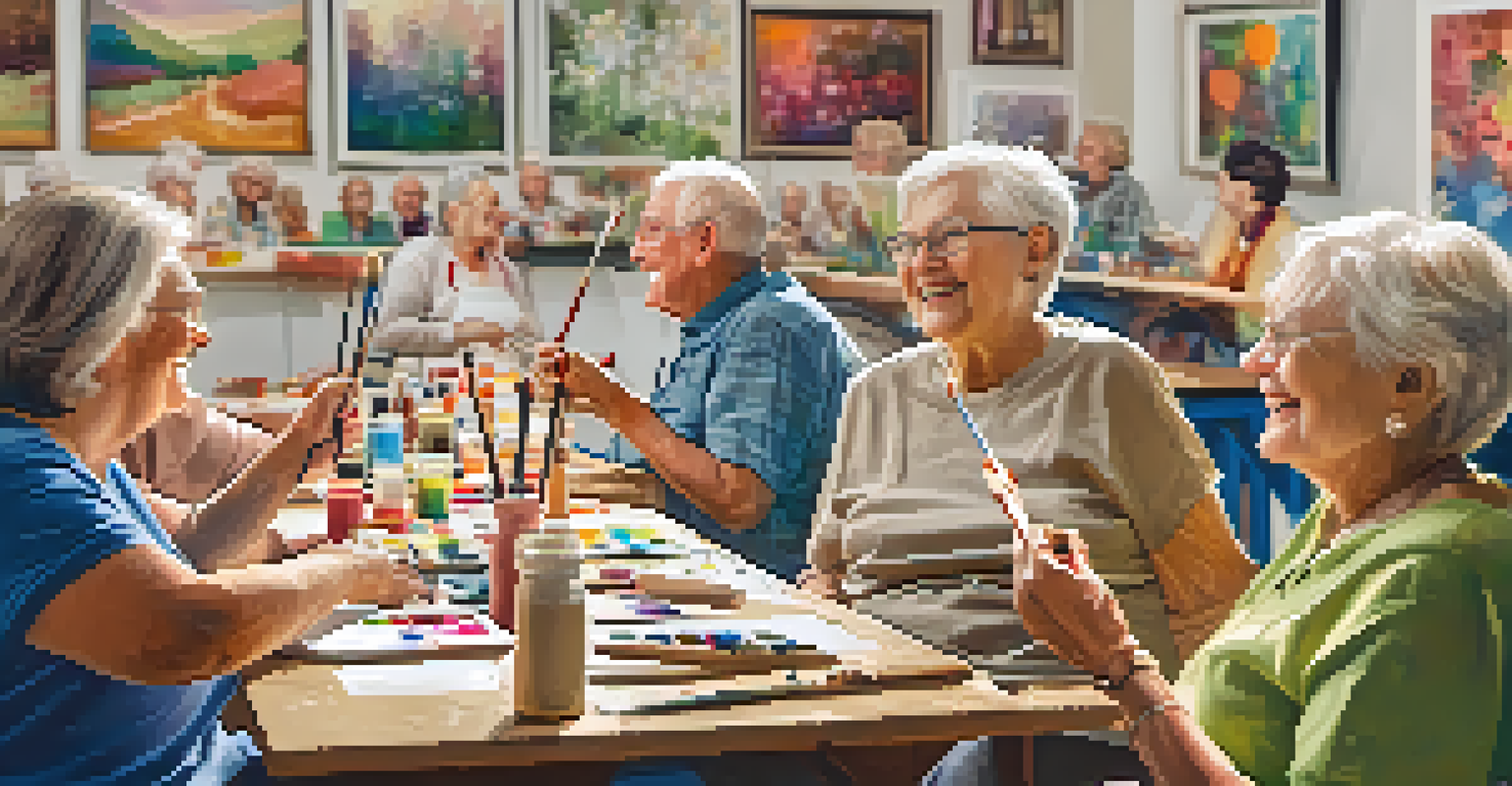Art and Memory: Exploring the Connection for Cognitive Health

Understanding the Link Between Art and Memory
Art and memory have a fascinating connection that can impact cognitive health. Engaging with art stimulates various brain regions, enhancing our ability to recall and process information. This interplay suggests that creating or even observing art can serve as a mental exercise, much like a workout for our brains.
Art is the most beautiful of all lies.
Research indicates that artistic activities activate neural pathways associated with memory. For instance, when we draw or paint, we often tap into our personal experiences, which helps reinforce those memories. This can be particularly beneficial for individuals looking to maintain or improve their cognitive function as they age.
Moreover, art encourages emotional expression, which is closely tied to memory formation. When we associate emotions with memories, those experiences become more vivid and easier to recall. Thus, engaging with art can create a rich tapestry of memories that supports cognitive health.
The Benefits of Art Therapy for Memory Enhancement
Art therapy is a structured approach that utilizes creative processes to improve mental health and cognitive function. By allowing individuals to express themselves artistically, art therapy can help unlock memories that may be buried or difficult to access. This therapeutic technique has shown promise, especially in populations dealing with memory loss or cognitive decline.

For instance, studies have demonstrated that art therapy can significantly improve the quality of life for patients with Alzheimer’s disease. Through guided artistic activities, these patients often exhibit better emotional regulation and enhanced memory recall. The creative process provides a non-verbal outlet, making it easier for them to connect with their past.
Art Enhances Memory and Cognition
Engaging with art stimulates brain regions, improving memory recall and cognitive function.
Additionally, art therapy fosters a sense of community and belonging, which can further enhance cognitive health. As participants share their artwork and experiences, they build social connections that are crucial for maintaining mental acuity. This collaborative aspect of art therapy adds another layer of benefit for cognitive health.
How Creating Art Boosts Brain Function
Creating art engages multiple areas of the brain, enhancing overall cognitive function. When we paint, draw, or sculpt, we utilize fine motor skills and visual-spatial reasoning, which are essential for memory retention. This multisensory engagement can lead to improved cognitive abilities over time.
Music can change the world because it can change people.
Moreover, the process of creating art encourages problem-solving and critical thinking. Artists often face challenges when bringing their visions to life, requiring them to think creatively and adapt. This mental flexibility can translate into better memory function as the brain becomes accustomed to navigating complex tasks.
Additionally, creating art promotes mindfulness, a practice that has been linked to improved memory and cognitive health. Being present in the moment while creating allows individuals to focus their thoughts, reducing distractions and enhancing memory consolidation. In this way, art becomes a powerful tool for mental clarity.
Visual Art and Its Impact on Memory Recall
Visual art, such as paintings and photographs, plays a unique role in memory recall. When we look at an artwork, it can evoke vivid memories associated with similar experiences or feelings. This phenomenon is known as visual imagery, and it can significantly enhance our ability to remember past events.
Moreover, the colors, shapes, and compositions in art can trigger emotional responses that help solidify memories. For instance, a bright, joyful painting may remind someone of a happy childhood memory, making it easier to retrieve that information later. This emotional connection to visual art serves as a powerful mnemonic device.
Art Therapy Aids Cognitive Health
Art therapy provides a creative outlet that can unlock memories and improve emotional well-being, especially in individuals with cognitive decline.
Additionally, engaging with visual art can improve observational skills, which are critical for memory retention. By training ourselves to notice details in artworks, we sharpen our attention and awareness. This heightened observational ability can lead to improved memory recall in everyday life.
Music: A Powerful Stimulus for Memory Function
Music is another art form that has a profound impact on memory. Melodies and rhythms can trigger memories and emotions, often transporting us back to specific moments in time. This phenomenon is widely recognized in both psychological research and everyday experiences, where a song can evoke nostalgia or vivid recollections.
Research has shown that music can enhance memory retention and recall, particularly in individuals with cognitive impairments. For example, patients with Alzheimer’s disease often respond positively to familiar tunes, which can help them recall personal memories and improve their overall mood. This connection highlights the therapeutic potential of music in cognitive health.
Furthermore, participating in musical activities, such as playing an instrument or singing, stimulates various brain regions, fostering neuroplasticity. This adaptability of the brain is essential for memory formation and retention. Thus, incorporating music into one’s routine can be a delightful way to support cognitive health.
The Role of Art in Cognitive Aging
As we age, maintaining cognitive health becomes increasingly important. Engaging in artistic activities has been shown to help mitigate cognitive decline. By exercising our creative muscles, we can enhance memory function and overall mental acuity as we grow older.
Regular participation in art-related activities, whether through painting, crafting, or music, can stimulate brain activity and promote social interaction. This combination is particularly beneficial for older adults, as it combats isolation and encourages cognitive engagement. Staying socially active is a key factor in maintaining cognitive health.
Music Boosts Memory and Mood
Familiar melodies can evoke emotions and memories, enhancing overall cognitive function and mood for individuals of all ages.
Additionally, the routine of engaging with art can provide structure and purpose, which are vital for mental well-being. Having a creative outlet can boost self-esteem and foster a sense of achievement, both of which contribute positively to cognitive aging. Ultimately, art serves as a valuable ally in the journey of aging gracefully.
Practical Ways to Incorporate Art into Daily Life
Incorporating art into daily life doesn’t have to be daunting. Simple activities, such as doodling, coloring, or even taking photographs, can provide cognitive benefits. The key is to find what resonates with you and make it a regular part of your routine.
Joining local art classes or community workshops can also be an excellent way to engage with art while meeting new people. These social interactions can enhance the cognitive benefits of artistic activities, creating a supportive environment for creativity and memory enhancement. Plus, learning new techniques can keep your brain active and engaged.

Lastly, don’t underestimate the power of art appreciation. Visiting galleries, museums, or even enjoying art online can stimulate your mind and evoke memories. Take time to reflect on the emotions and thoughts that arise when you engage with art, as this introspection can further enhance your cognitive health.